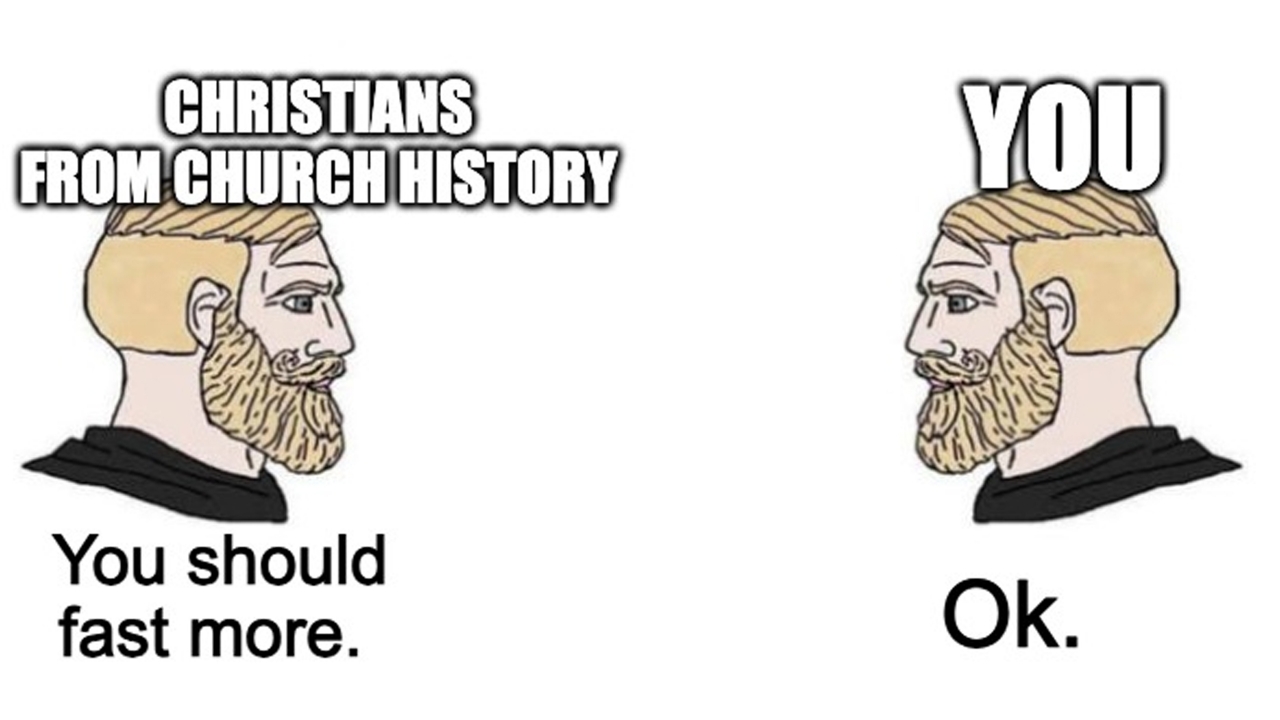
Do You Even Fast Bro?
In an emasculated world that teaches men to be weak, it is no surprise that ‘Muscular Christianity’ is making something of a comeback. Memes of chiseled, bearded men saying things like, “Your terms are acceptable” in response to left-wing demands that ‘if women should have to give birth to the children they are pregnant with then the men should stay and pay for the child’s upbringing’ represent a much needed return to Christian self-confidence and godly masculinity. I like to hit the weights myself, and am raising my sons to go outside in all weather and play a range of sports.
However the ‘ditches on both sides’ adage holds true in this area as much as anywhere else. And whilst the disciplines of exercise and healthy eating are commendable pursuits, I’ve come to believe that there is a significant gap in the spiritual discipline of most believers in our day. I’d add that I think it is most notably absent among reformed believers, compared to their Pentecostal or Charismatic friends. From my own experience, one of the reasons it is lacking is because it is the hardest discipline to pursue, and also the one that makes you physically weaker in the process - at least temporarily.
It is the discipline of fasting.
A recent poll that we ran here on Clear Truth, which is hardly a place for half-baked, quasi-nominal Christians - you readers are a pretty based bunch by my reckoning - showed that 80% of those who responded did not fast regularly. It’s probably higher than that, given that people who practice it are more likely to respond to such a question, which likely biases the results.
Can you imagine that with any other spiritual discipline among arguably the most committed group of believers? What if 80% of us didn’t pray regularly, or read the Word regularly, or attend church regularly? Yet this discipline is almost entirely overlooked by huge sections of the church in our day.
We Are Weaker Than Our Forefathers
Such a widespread lack of fasting is a historical anomaly. The early church was well known for fasting two days per week, with the Didache instructing them, “But let not your fasts be with the hypocrites, for they fast on Mondays and Thursdays, but you should fast on Wednesdays and Fridays." Notice the assumption that fasts would be held, and the only question was over when they would do this, not if.
Such twice-weekly fasting went on for centuries, as seen when Tertullian wrote the same instruction in his work ‘On Fasting’, saying "We fast on the fourth and sixth days of the week..."
Fast forward to the incredible move of God that took place on the island of Ireland, from which the former Roman Empire was re-evangelized in the AD 600s. These Irish monks were known for embracing what they described as ‘Green Martyrdom’, consisting of a hard regime of fasting, and also endorsed observing three Lenten fasts each year.
Though the Catholic church had perhaps pushed their view of fasting into the realms of legalism, the Reformers made sure to encourage people towards it for the right reasons. Luther called fasting “fine outward training” and Calvin similarly declared that many, “for want of knowing its usefulness, undervalue its necessity: and some reject it as almost superfluous.”
Later the Puritans similarly called for ‘Days Of Fasting And Humiliation’ for their whole communities, with John Winthrop famously declaring a fast in the Massachusetts Bay Colony in response to drought and crop failure.
Jonathan Edwards fasted for days before first delivering his sermon, ‘Sinners In The Hands Of An Angry God’, and wrote in ‘Some Thoughts Concerning the Present Revival’, “I should think ministers, above all persons, ought to be much in secret prayer and fasting, and also much in praying and fasting with one another.” When commenting on Matthew 17:21, Edwards summarized succinctly, “fasting is a part of Christian worship.”
Later John Wesley and the Methodists returned to the early church practice of fasting two days per week. It was so essential to their movement that he would not ordain anyone who did not fast two days a week.
Of course, all of this can be understood as a simple outworking of the clear words of Jesus. In Matthew 6:16, he said to us, “And when you fast, do not look gloomy like the hypocrites, for they disfigure their faces that their fasting may be seen by others.” Notice that, just like the early church, Christ did not say ‘if you fast’, as though this were a mere option for his church. Indeed, he placed right alongside prayer and generosity as the kind of disciplines his followers would need.
The Masculine Practice Of Fasting
Returning to my opening point, fasting has long been regarded as a cornerstone of spiritual strength and, indeed, a sign of true godly masculinity. As St Basil wrote, “Fasting gives birth to prophets and strengthens the powerful. Fasting makes lawgivers wise. Fasting is a good safeguard for the soul, a steadfast companion for the body, a weapon for the valiant, and a gymnasium for athletes.”
John Chrysostom would likely agree, saying, “So too, when the fast makes its appearance, like a kind of spiritual summer, let us as soldiers burnish our weapons; and as husbandmen let us sharpen our sickle; and as sailors let us order our thoughts against the waves of extravagant desires; and as travelers let us set out on the journey towards heaven; and as wrestlers let us strip for the contest.”
Fasting, it would seem, is not for weaklings.
Indeed in my experience, regular short fasting and occasional long fasting is infinitely harder than getting into the gym and lifting some weights. Even if you push the physical exercise hard, the gnawing in your stomach, the lightheadedness, the troubled sleep whilst longing for food when you still have days to go, is quite simply brutal. It takes a whole different level of strength.
Fasting As Fighting
But fasting also builds strength. Let’s be honest, part of the reason we like to hit the gym is we want to be ready for a hypothetical fight. That’s commendable, particularly if you need to do so to protect your family. However, how many physical fights are you actually likely to get into in your lifetime as a Christian? If you’re wise, hopefully very few, if any.
But spiritually you go to battle every single day. You are at war against your flesh, against Satan, and against the spirit of the age. Constantly. And these things seek to destroy your life in a way that getting a black eye in a physical fight never could. Fasting is both training for that battle, and engaging in it.
Indeed our ancestors believed this. St Athanasius wrote: “Devils take great delight in fullness, and drunkenness and bodily comfort. Fasting possesses great power and it works glorious things.”
Augustine would double down on the spiritual victory this practice makes possible, saying, “Fasting cleanses the soul, raises the mind, subjects one’s flesh to the spirit, renders the heart contrite and humble, scatters the clouds of concupiscence, quenches the fire of lust, and kindles the true light of chastity. Enter again into yourself.”
It has always been viewed as a vital spiritual weapon.
Many people misread Matthew 4, when Satan comes to tempt Christ after his forty days of fasting, and think Satan attacked him at his weakest. Not at all. Christ was preparing to be at his strongest for such a battle. Fasting was essential to his victory.
Fasting Brings Power
Furthermore, are we not in need of vastly more spiritual power than we see in the church at present? Our doctrine can be sound, our preaching exegetical, our theology precise - but why did our forefathers see so much more fruit than we did? Is it merely a matter of divine sovereignty, and therefore something we can do nothing about? Or perhaps, could this practice be an essential element to seeing our words land with the full force of the Holy Spirit behind them?
It’s interesting that Christ, when He went into the wilderness, is described as being “led by the Spirit,’ (Matthew 4:1) and ‘full of the Spirit’. (Luke 4:1) But after His fast, Luke tells us that he “returned in the power of the Spirit” (Luke 4:14).
It is just such power that we need for the battles in our day.
So maybe we should man up and fast a bit more?


